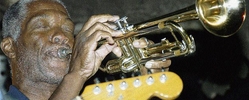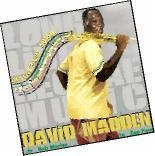
Trumpeter David Madden ... When I look at my age and the things I have done, I say 'long live reggae music'.
- File
Since formally entering the popular Jamaican music business when ska was on the wane and rocksteady on the rise, trumpeter David Madden has seen many changes in beats and personalities.
And he has not only noted the developments, but also made adjustments himself.
Madden's latest album, Long Live Reggae Music, is yet another of those shifts to accommodate changing times without compromising his art. However, this time, the change is back to very familiar ground, the music that Madden started with when he went to Studio One, fresh out of the army at 21 years old, this after his stint at the legendary Alpha Academy.
And the changes were observed far from Jamaica's shores.
In 2004/2005 Madden went on yet another tour, this time with The Gladiators, Toots Hibbert, the Skatalites and Max Romeo. "When I go out there and see how the people railing for the Gladiators and Max Romeo, I say, 'What is happening here?' These guys don't even play in Jamaica anymore," Madden told The Sunday Gleaner.
"I said to myself, when I look at my age and the things I have done, I say 'long live reggae music'. Long live the things when you were 18, 19, 20 and you were around Coxsone (Clement Dodd) and created and they go out to the world," Madden said.
ALBUM LAUNCH

David Madden's album cover, Long Live Reggae Music. - Contributed
The 14-track Long Live Reggae Music was released at a launch concert in early March, held at Redbones The Blues Café, Braemar Avenue, New Kingston. It starts with the title track, on which Madden pays homage to many genres of Jamaican music, from ska to 'ragga' (he tells The Sunday Gleaner that ska is his favourite). It includes nods to his days with Zap Pow Band, Jah Hawn, featuring the horns only (saxophonist Glen DaCosta is featured) and Jahovah using the same rhythm, but with Madden also singing. The same approach is taken to another Zap Pow track, Life and Life's Dream being the instrumental and vocal sides respectively of the same song.
Madden said he had done the album, which took two years to make, with a mix of instrumentals and vocals "because of how the music is running today". He noted that putting out a straight instrumental album rarely guarantees sufficient returns to fund a follow-up project. However, "everybody understands the vocals".
Recording vocals came late to Madden, as when he started doing solo albums in 1983 with Going Bananas he was told that he should play the trumpet and not sing. "I took it hard," Madden said. However, "when I reach 1985 or 1986 I say no, you can't take it way. When I started playing the trumpet it took me two weeks to get a sound. And when it came out I sounded like a cow in a pasture. After four years, somebody turn to me and say you sorta can blow that thing. After 10 years they say you sound OK; 20 years they say you sound good".
So he has taken the same approach to developing his vocals, which Madden admits do need some work. "Each of us has a voice. If you spend time dealing with your voice you will reach somewhere. I'm still working on it," Madden said.
LOVE SONG
Nadine is the love song on Long Live Reggae Music. It is not about anyone in particular and Madden laughs heartily when The Sunday Gleaner asked him about lyrics in the song which go "things and time now has changed/so a stop using analogue/programming fast like lightning/now a gone in a digital repeat". How that one came about is a mystery to him.
"When I a sing about Nadine, how I reach to analogue and digital? But this is just the creative mind," Madden said.
The music for Nuh Change dates back to 1972, Madden adding the lyrics recently. "Over time you hear this song and you put words to it," he said.
Other Madden solo albums are Reggae Trumpeter in 1987, Changing Times, Dancehaawn, Cybercharged Ska and Cybernetix Online.
Madden got his break into popular music at Studio One when he was taking a break from his 15-hour-a-day practice sessions and visited the Brentford Road (now Studio One Boulevard) studio. There was a call for horn players and Madden, an unknown, went to the door. He was being turned back, but Bob Andy said he should be let in and Madden played on Andy's I've Got To Go Back Home that day. His next session was with Burning Spear's Door Peep, and from then there was no turning back.
Madden has not planned another project yet, taking his standard approach of allowing some time to elapse before tackling anything else. "I make a little time pass through, a year or so blow off, and then something else comes," he said.